Mitchell Т. Machine learning
Подождите немного. Документ загружается.

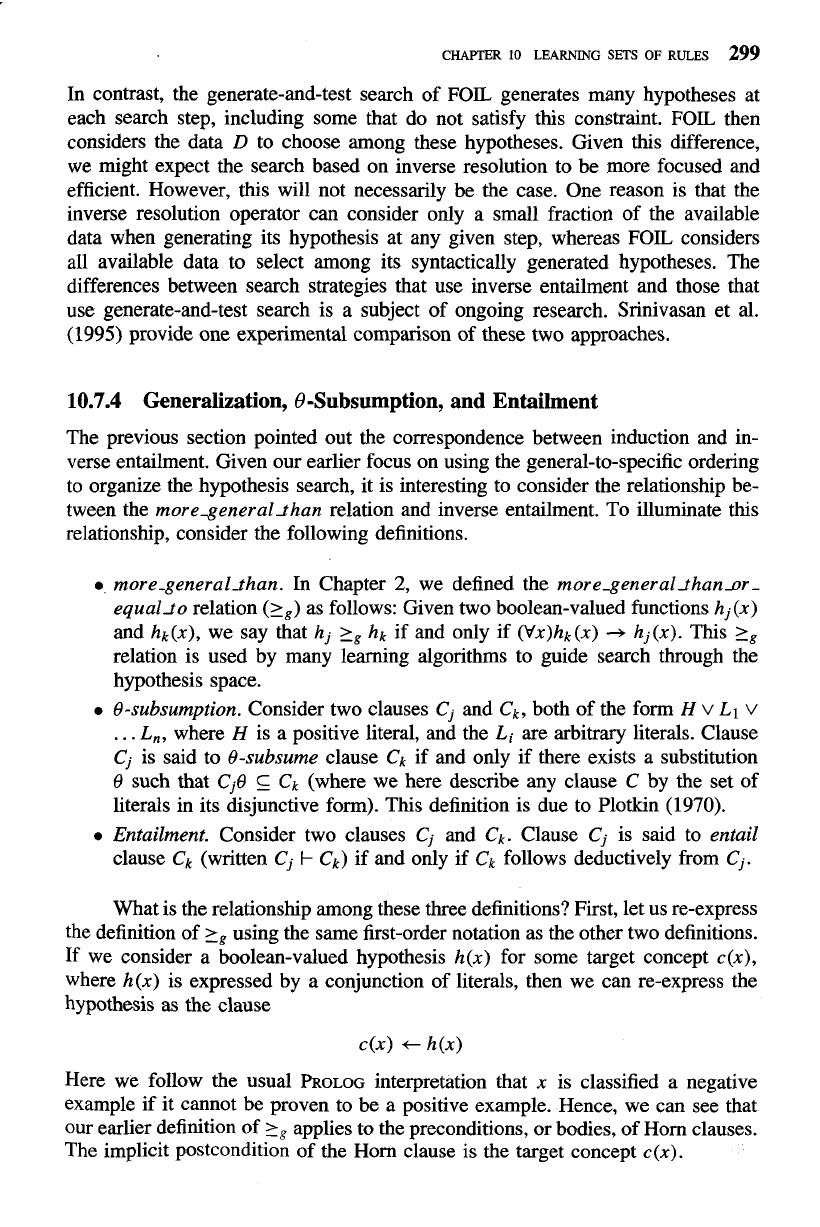
In contrast, the generate-and-test search of FOIL generates many hypotheses at
each search step, including some that do not satisfy this constraint. FOIL then
considers the data
D
to choose among these hypotheses. Given this difference,
we might expect the search based on inverse resolution to be more focused and
efficient. However, this will not necessarily be the case. One reason is that the
inverse resolution operator can consider only a small fraction of the available
data when generating its hypothesis at any given step, whereas FOIL considers
all available data to select among its syntactically generated hypotheses. The
differences between search strategies that use inverse entailment and those that
use generate-and-test search is a subject of ongoing research. Srinivasan et al.
(1995)
provide one experimental comparison of these two approaches.
10.7.4
Generalization, 8-Subsumption, and Entailment
The previous section pointed out the correspondence between induction and in-
verse entailment. Given our earlier focus on using the general-to-specific ordering
to organize the hypothesis search, it is interesting to consider the relationship be-
tween the
more-general~han relation and inverse entailment. To illuminate this
relationship, consider the following definitions.
0
more-general-than.
In
Chapter
2,
we defined the more_general_than_or-
equal20 relation
(z,)
as follows: Given two boolean-valued functions hj(x)
and hk(x), we say that hj
2,
hk if and only if (Vx)hk(x)
+
hj(x). This
>,
relation is used by many learning algorithms to guide search through the
hypothesis space.
0
8-subsumption. Consider two clauses Cj and Ck, both of the form
H
v
L1
v
.
. .
L,,
where
H
is a positive literal, and the
Li
are arbitrary literals. Clause
Cj is said to 8-subsume clause Ck if and only if there exists a substitution
0
such that CjO
G
Ck (where we here describe any clause C by the set of
literals in its disjunctive form). This definition is due to Plotkin
(1970).
0
Entailment. Consider two clauses Cj and Ck. Clause Cj is said to entail
clause Ck (written Cj
k
Ck) if and only if Ck follows deductively from C,.
What is the relationship among these three definitions? First, let us re-express
the definition of
2,
using the same first-order notation as the other two definitions.
If we consider a boolean-valued hypothesis h(x) for some target concept c(x),
where h(x) is expressed by a conjunction of literals, then we can re-express the
hypothesis as the clause
Here we follow the usual
PROLOG
interpretation that x is classified a negative
example if it cannot be proven to be a positive example. Hence, we can see that
our earlier definition of
1,
applies to the preconditions, or bodies, of Horn clauses.
The implicit postcondition of the Horn clause is the target concept c(x).
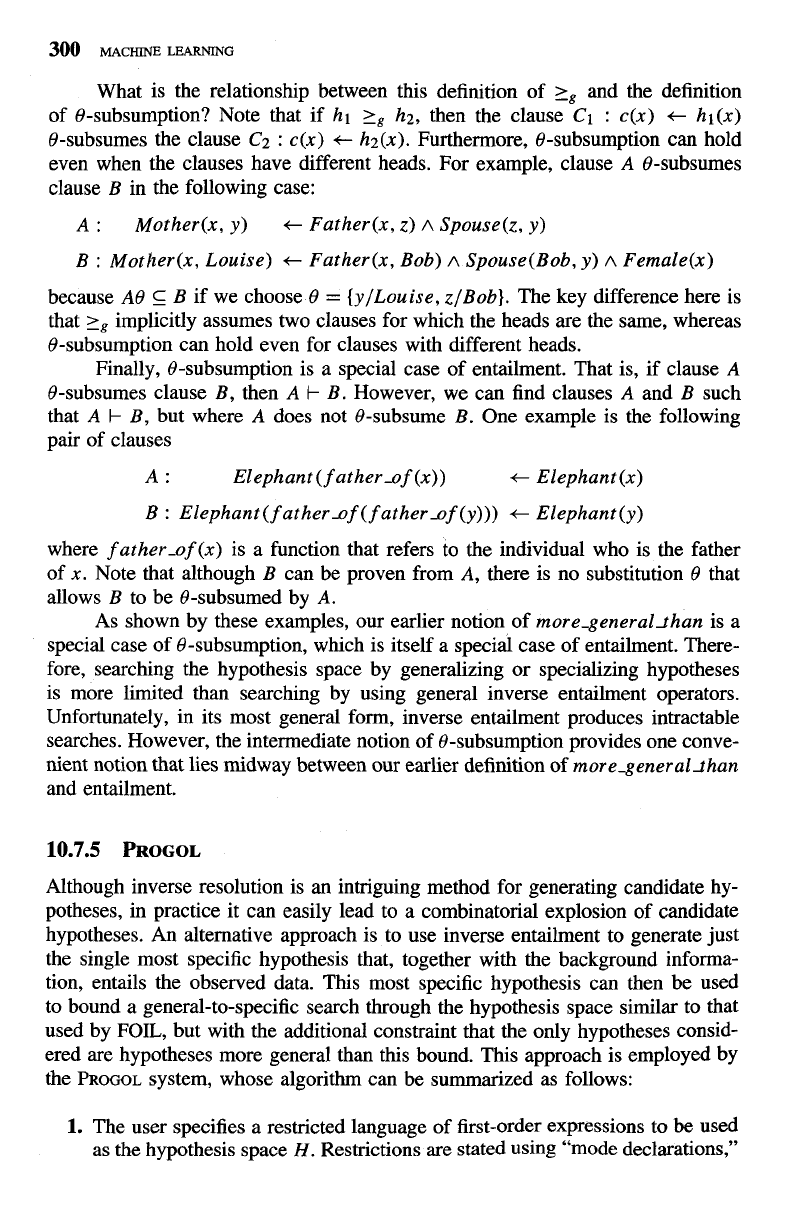
What is the relationship between this definition of
2,
and the definition
of 8-subsumption? Note that if
hl
p,
h2,
then the clause
C1
:
c(x)
t
hl(x)
8-subsumes the clause
C2
:
c(x)
t
h2(x).
Furthermore, 8-subsumption can hold
even when the clauses have different heads. For example, clause A 8-subsumes
clause
B
in the following case:
A
:
Mother(x, y)
t
Father(x, z)
A
Spouse(z, y)
B
:
Motker(x, Louise)
t
Father(x, Bob)
A
Spouse(Bob, y)
A
Female@)
because A8
G
B
if we choose 8
=
{ylLouise, zlBob).
The key difference here is
that
>,
implicitly assumes two clauses for which the heads are the same, whereas
8-subsumption can hold even for clauses with different heads.
Finally, 8-subsumption is a special case of entailment. That is, if clause A
8-subsumes clause
B,
then A
k
B.
However, we can find clauses A and
B
such
that
A
F
B,
but where A does not 8-subsume
B.
One example is the following
pair of clauses
A
:
Elephant(father_of (x))
t
Elephant (x)
B
:
Elephant (f athersf (f ather-f (y)))
t
Elephant (y)
where
f ather-of (x)
is a function that refers to the individual who is the father
of
x.
Note that although
B
can be proven from A, there is no substitution 8 that
allows
B
to be &subsumed by
A.
As shown by these examples, our earlier notion of
more-general~han
is a
special case of 8-subsumption, which is itself a special case of entailment. There-
fore, searching the hypothesis space by generalizing or specializing hypotheses
is more limited than searching by using general inverse entailment operators.
Unfortunately, in its most general form, inverse entailment produces intractable
searches. However, the intermediate notion of 8-subsumption provides one conve-
nient notion that lies midway between our earlier definition of
more-general~han
and entailment.
Although inverse resolution is an intriguing method for generating candidate hy-
potheses, in practice it can easily lead to a combinatorial explosion of candidate
hypotheses.
An
alternative approach is to use inverse entailment to generate just
the single most specific hypothesis that, together with the background informa-
tion, entails the observed data. This most specific hypothesis can then be used
to bound a general-to-specific search through the hypothesis space similar to that
used by FOIL, but with the additional constraint that the only hypotheses consid-
ered are hypotheses more general than this bound. This approach is employed by
the
PROGOL
system, whose algorithm can be summarized as follows:
1.
The user specifies a restricted language of first-order expressions to
be
used
as the hypothesis space
H.
Restrictions are stated using "mode declarations,"
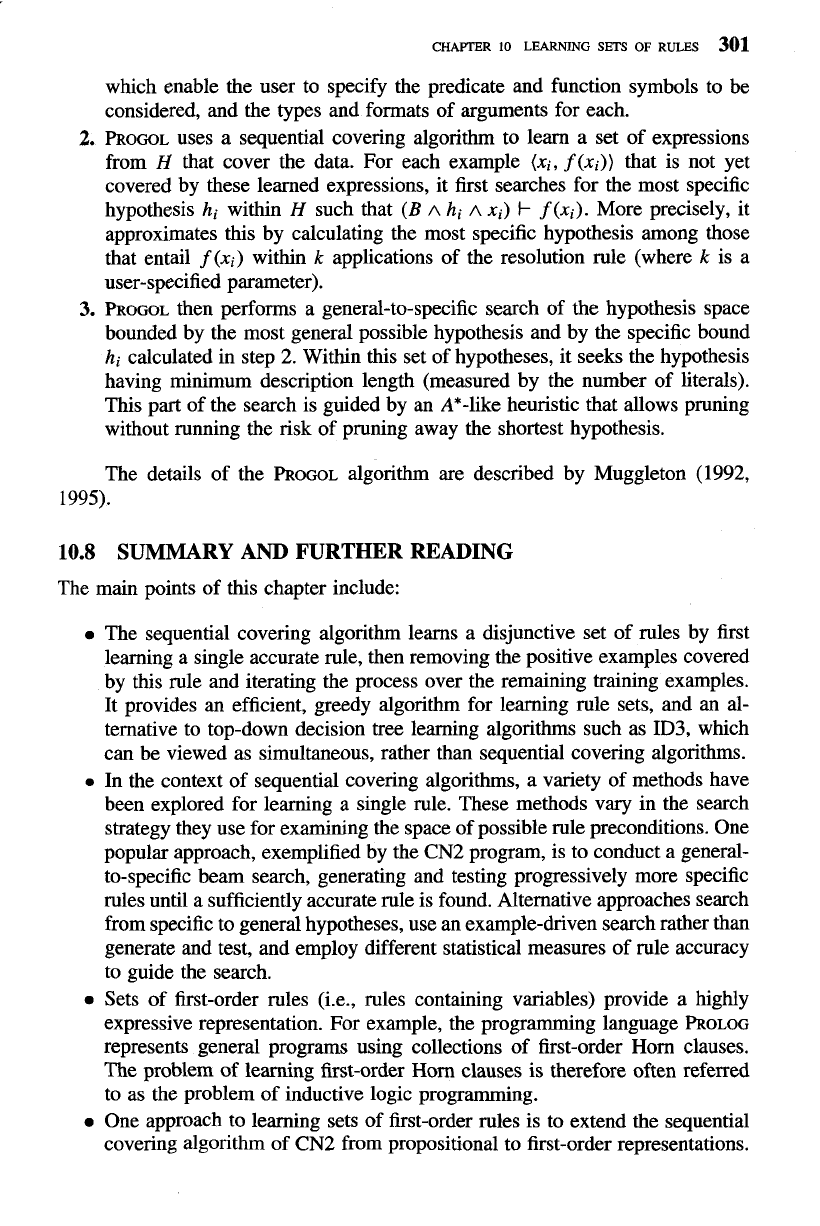
which enable the user to specify the predicate and function symbols to be
considered, and the types and formats of arguments for each.
2.
PROGOL
uses a sequential covering algorithm to learn a set of expressions
from
H
that cover the data. For each example
(xi,
f
(xi))
that is not yet
covered by these learned expressions, it first searches for the most specific
hypothesis
hi
within
H
such that
(B
A
hi
A
xi)
l-
f
(xi).
More precisely, it
approximates this by calculating the most specific hypothesis among those
that entail
f
(xi)
within
k
applications of the resolution rule (where
k
is a
user-specified parameter).
3.
PROGOL
then performs a general-to-specific search of the hypothesis space
bounded by the most general possible hypothesis and by the specific bound
hi
calculated in step 2. Within this set of hypotheses, it seeks the hypothesis
having minimum description length (measured by the number of literals).
This part of the search is guided by an A*-like heuristic that allows pruning
without running the risk of pruning away the shortest hypothesis.
The details of the
PROGOL
algorithm are described by Muggleton (1992,
1995).
10.8
SUMMARY
AND
FURTHER
READING
The main points of this chapter include:
The sequential covering algorithm learns a disjunctive set of rules by first
learning a single accurate rule, then removing the positive examples covered
by this rule and iterating the process over the remaining training examples.
It provides an efficient, greedy algorithm for learning rule sets, and an al-
ternative to top-down decision tree learning algorithms such as ID3, which
can be viewed as simultaneous, rather than sequential covering algorithms.
0
In the context of sequential covering algorithms, a variety of methods have
been explored for learning a single rule. These methods vary in the search
strategy they use for examining the space of possible rule preconditions. One
popular approach, exemplified by the CN2 program, is to conduct a
general-
to-specific beam search, generating and testing progressively more specific
rules until a sufficiently accurate rule is found. Alternative approaches search
from specific to general hypotheses, use an example-driven search rather than
generate and test, and employ different statistical measures of rule accuracy
to guide the search.
Sets of first-order rules (i.e., rules containing variables) provide a highly
expressive representation. For example, the programming language
PROLOG
represents general programs using collections of first-order Horn clauses.
The problem of learning first-order Horn clauses is therefore often referred
to as the problem of inductive logic programming.
One approach to learning sets of first-order rules is to extend the sequential
covering algorithm of CN2 from propositional to first-order representations.
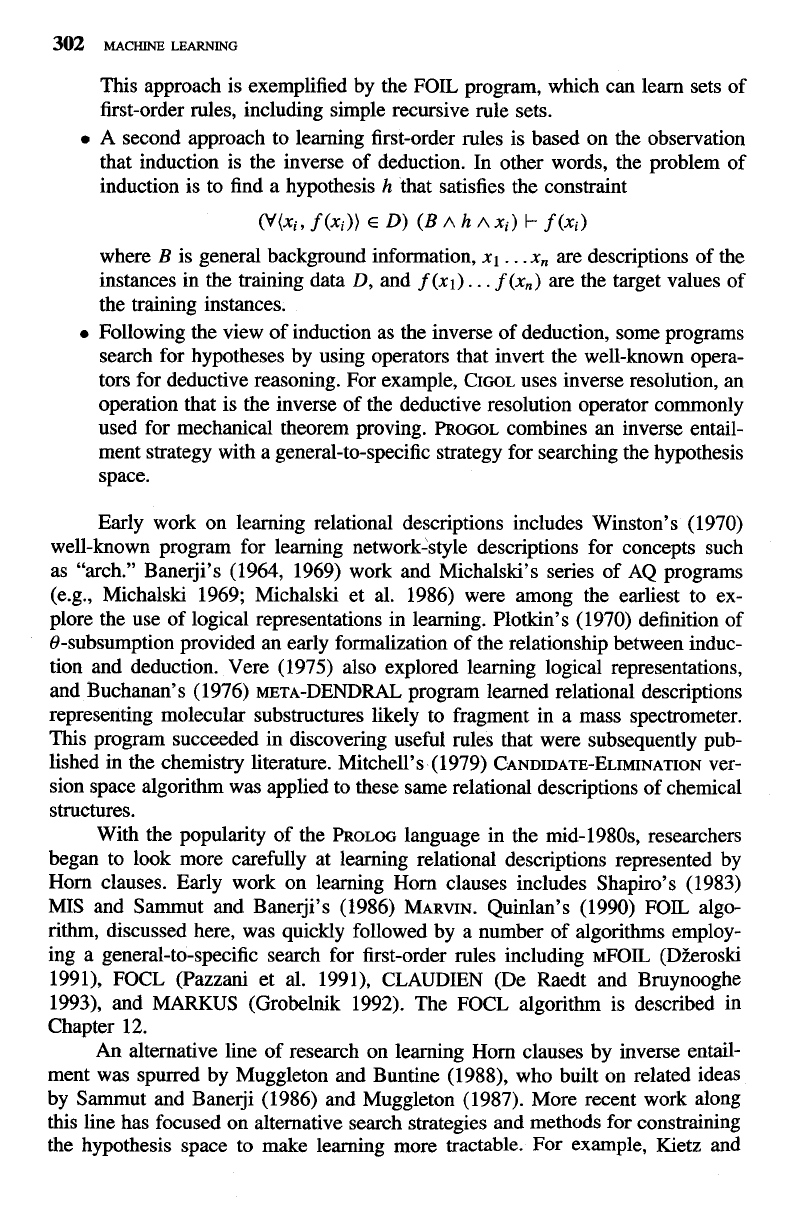
This approach is exemplified by the FOIL program, which can learn sets of
first-order rules, including simple recursive rule sets.
0
A second approach to learning first-order rules is based on the observation
that induction is the inverse of deduction. In other words, the problem of
induction is to find a hypothesis
h
that satisfies the constraint
where
B
is general background information,
XI.
. .
x, are descriptions of the
instances in the training data
D,
and
f
(XI).
.
.
f
(x,) are the target values of
the training instances.
0
Following the view of induction as the inverse of deduction, some programs
search for hypotheses by using operators that invert the well-known opera-
tors for deductive reasoning. For example, CIGOL uses inverse resolution, an
operation that is the inverse of the deductive resolution operator commonly
used for mechanical theorem proving.
PROGOL
combines
an
inverse entail-
ment strategy with a general-to-specific strategy for searching the hypothesis
space.
Early work on learning relational descriptions includes
Winston's (1970)
well-known program for learning network-style descriptions for concepts such
as "arch." Banerji7s (1964, 1969) work and Michalski7s series of AQ programs
(e.g., Michalski 1969; Michalski et al. 1986) were among the earliest to ex-
plore the use of logical representations in learning. Plotkin's (1970) definition of
8-subsumption provided an early formalization of the relationship between induc-
tion and deduction. Vere (1975) also explored learning logical representations,
and Buchanan's (1976)
META-DENDRAL program learned relational descriptions
representing molecular substructures likely to fragment in a mass spectrometer.
This program succeeded in discovering useful rules that were subsequently pub-
lished in the chemistry literature. Mitchell's (1979) CANDIDATE-ELIMINATION ver-
sion space algorithm was applied to these same relational descriptions of chemical
structures.
With the popularity of the PROLOG language in the mid-1980~~ researchers
began to look more carefully at learning relational descriptions represented by
Horn clauses. Early work on learning Horn clauses includes Shapiro's (1983)
MIS and Sammut and Banerji's (1986) MARVIN. Quinlan7s (1990) FOIL algo-
rithm, discussed here, was quickly followed by a number of algorithms employ-
ing a general-to-specific search for first-order rules including
MFOIL
(Dieroski
1991), FOCL (Pazzani et
al.
1991), CLAUDIEN (De Raedt and Bruynooghe
1993), and MARKUS (Grobelnik 1992). The FOCL algorithm is described in
Chapter 12.
An alternative line of research on learning Horn clauses by inverse entail-
ment was spurred by Muggleton and Buntine (1988), who built on related ideas
by Sammut and Banerji (1986) and Muggleton (1987). More recent work along
this line has focused on alternative search strategies and methods
for
constraining
the hypothesis space to make learning more tractable. For example, Kietz and
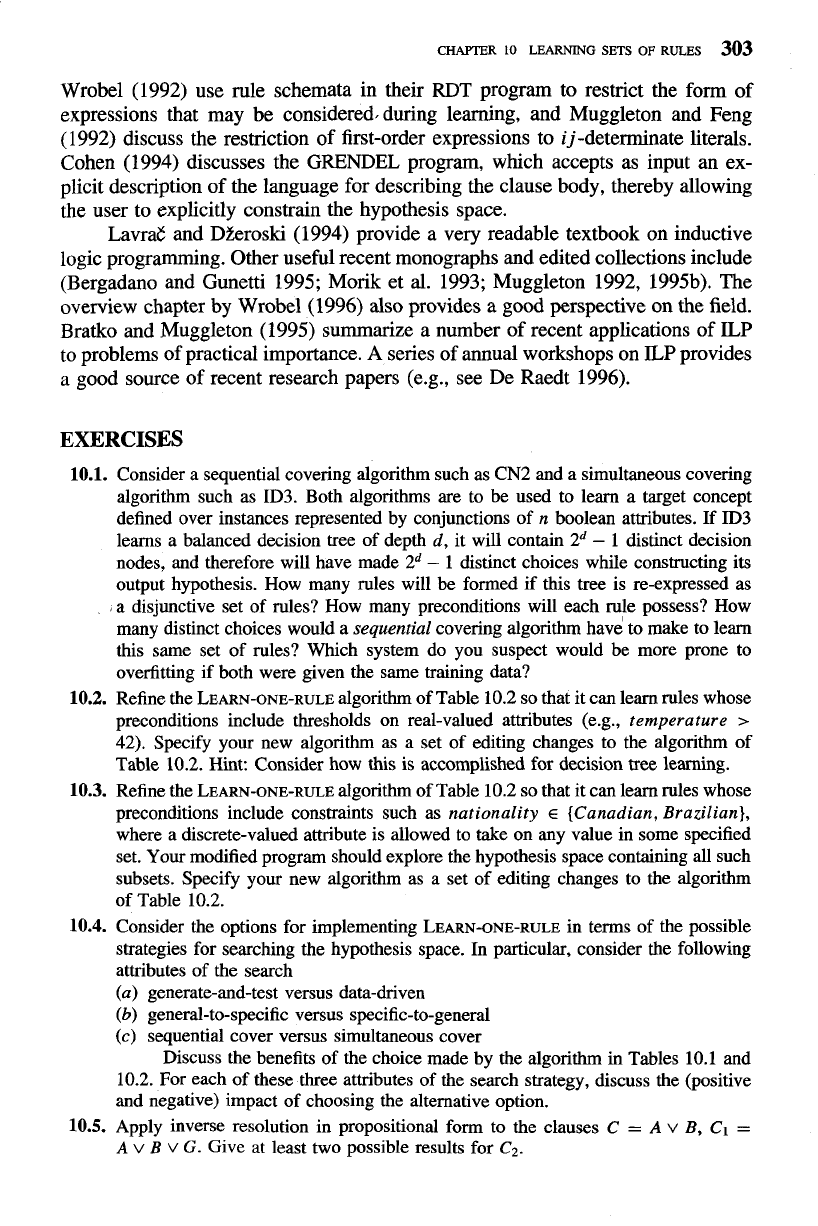
Wrobel (1992) use rule schemata in their
RDT
program to restrict the form of
expressions that may be considered, during learning, and Muggleton and Feng
(1992) discuss the restriction of first-order expressions to ij-determinate literals.
Cohen (1994) discusses the
GRENDEL program, which accepts as input an ex-
plicit description of the language for describing the clause body, thereby allowing
the user to explicitly constrain the hypothesis space.
LavraC and DZeroski (1994) provide a very readable textbook on inductive
logic programming. Other useful recent monographs and edited collections include
(Bergadano and Gunetti 1995; Morik et
al.
1993; Muggleton 1992, 1995b). The
overview chapter by Wrobel(1996) also provides a good perspective on the field.
Bratko and Muggleton (1995) summarize a number of recent applications of
ILP
to problems of practical importance.
A
series of annual workshops on
ILP
provides
a good source of recent research papers (e.g., see De Raedt 1996).
EXERCISES
10.1.
Consider a sequential covering algorithm such as CN2 and a simultaneous covering
algorithm such as ID3. Both algorithms are to be used to learn a target concept
defined over instances represented by conjunctions of
n
boolean attributes.
If
ID3
learns a balanced decision tree of depth d, it will contain 2d
-
1 distinct decision
nodes, and therefore will have made 2d
-
1
distinct choices while constructing its
output hypothesis. How many rules will be formed if this tree is re-expressed as
t
a disjunctive set of rules? How many preconditions will each
ru?e
possess? How
many distinct choices would
a
sequential covering algorithm have to make to learn
this same set of rules? Which system do you suspect would be more prone to
overfitting if both were given the same training data?
10.2.
Refine the
LEARN-ONE-RULE
algorithm of Table 10.2 so that it can learn rules whose
preconditions include thresholds on real-valued attributes (e.g., temperature
>
42). Specify your new algorithm as a set of editing changes to the algorithm of
Table 10.2. Hint: Consider how this is accomplished for decision
tree
learning.
10.3.
Refine the
LEARN-ONE-RULE
algorithm of Table 10.2 so that it can learn rules whose
preconditions include constraints such as nationality
E
{Canadian, Brazilian},
where a discrete-valued attribute is allowed to take on any value in some specified
set. Your modified program should explore the hypothesis space containing all such
subsets. Specify your new algorithm as a set of editing changes to the algorithm
of Table 10.2.
10.4.
Consider the options for implementing
LEARN-ONE-RULE
in terms of the possible
strategies for searching the hypothesis space. In particular, consider the following
attributes of the search
(a) generate-and-test versus data-driven
(b)
general-to-specific versus specific-to-general
(c)
sequential cover versus simultaneous cover
Discuss the benefits of the choice made by the algorithm in Tables 10.1 and
10.2. For each of these three attributes of the search strategy, discuss the (positive
and negative) impact of choosing the alternative option.
10.5.
Apply inverse resolution in propositional form to the clauses
C
=
A
v
B,
C1
=
A
v
B
v
G.
Give at least two possible results for
CZ.
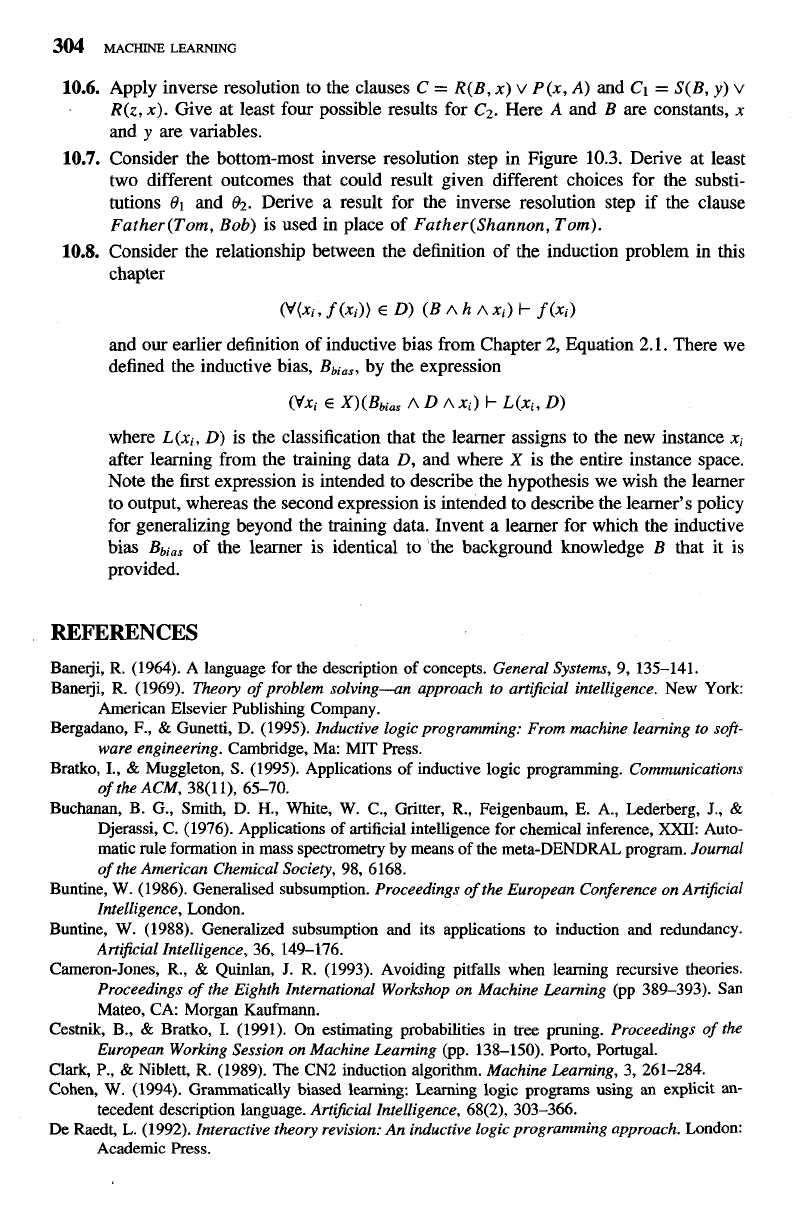
10.6.
Apply inverse resolution to the clauses C
=
R(B,
x)
v
P(x,
A)
and CI
=
S(B,
y)
v
R(z,
x).
Give at least four possible results for C2. Here
A
and
B
are constants,
x
and
y
are variables.
10.7.
Consider the bottom-most inverse resolution step in Figure
10.3.
Derive at least
two different outcomes that could result given different choices for the substi-
tutions
el
and 02. Derive a result for the inverse resolution step if the clause
Father(Tom, Bob)
is used in place of
Father(Shannon, Tom).
10.8.
Consider the relationship between the definition of the induction problem in this
chapter
and our earlier definition of inductive bias from Chapter
2,
Equation
2.1.
There we
defined the inductive bias,
Bbias,
by the expression
where
L(xi,
D)
is the classification that the learner assigns to the new instance
xi
after learning from the
training
data
D,
and where
X
is the entire instance space.
Note the first expression is intended to describe the hypothesis we wish the learner
to output, whereas the second expression is intended to describe the learner's policy
for generalizing beyond the training data. Invent a learner for which the inductive
bias
Bbias
of the learner is identical to the background knowledge
B
that it is
provided.
REFERENCES
Banerji, R. (1964). A language for the description of concepts.
General Systems,
9, 135-141.
Bane rji, R. (1969).
Theory of problem solving-an approach to artijicial intelligence.
New York:
American Elsevier Publishing Company.
Bergadano,
F.,
&
Gunetti, D. (1995).
Inductive logic programming: From machine learning to soft-
ware engineering.
Cambridge, Ma:
MIT
Press.
Bratko,
I.,
&
Muggleton,
S.
(1995). Applications of inductive logic programming.
Communications
of the ACM,
38(1 I), 65-70.
Buchanan, B. G., Smith, D.
H.,
White,
W.
C., Gritter, R., Feigenbaum, E. A., Lederberg,
J.,
&
Djerassi, C. (1976). Applications of artificial intelligence for chemical inference,
XXII:
Auto-
matic rule formation in mass spectrometry by means of the meta-DENDRAL program.
Journal
of the American Chemical Society,
98, 6168.
Buntine,
W.
(1986). Generalised subsumption.
Proceedings of the European Conference on Artijicial
Intelligence,
London.
Buntine, W.
(1988). Generalized subsumption and its applications to induction and redundancy.
Artificial Intelligence,
36, 149-176.
Cameron-Jones, R.,
&
Quinlan, J.
R.
(1993). Avoiding pitfalls when learning recursive theories.
Proceedings of the Eighth International Workshop on Machine Learning
(pp 389-393). San
Matw, CA: Morgan Kaufmann.
Cestnik, B.,
&
Bratko,
I.
(1991). On estimating probabilities in tree pruning.
Proceedings of the
European Working Session on Machine Learning
@p. 138-150). Porto, Portugal.
Clark, P.,
&
Niblett,
R.
(1989). The CN2 induction algorithm.
Machine Learning,
3, 261-284.
Cohen,
W.
(1994). Grammatically biased learning: Learning logic programs using an explicit an-
tecedent description language.
ArtGcial Intelligence,
68(2), 303-366.
De Raedt,
L.
(1992).
Interactive theory revision: An inductive logic programming approach.
London:
Academic Press.
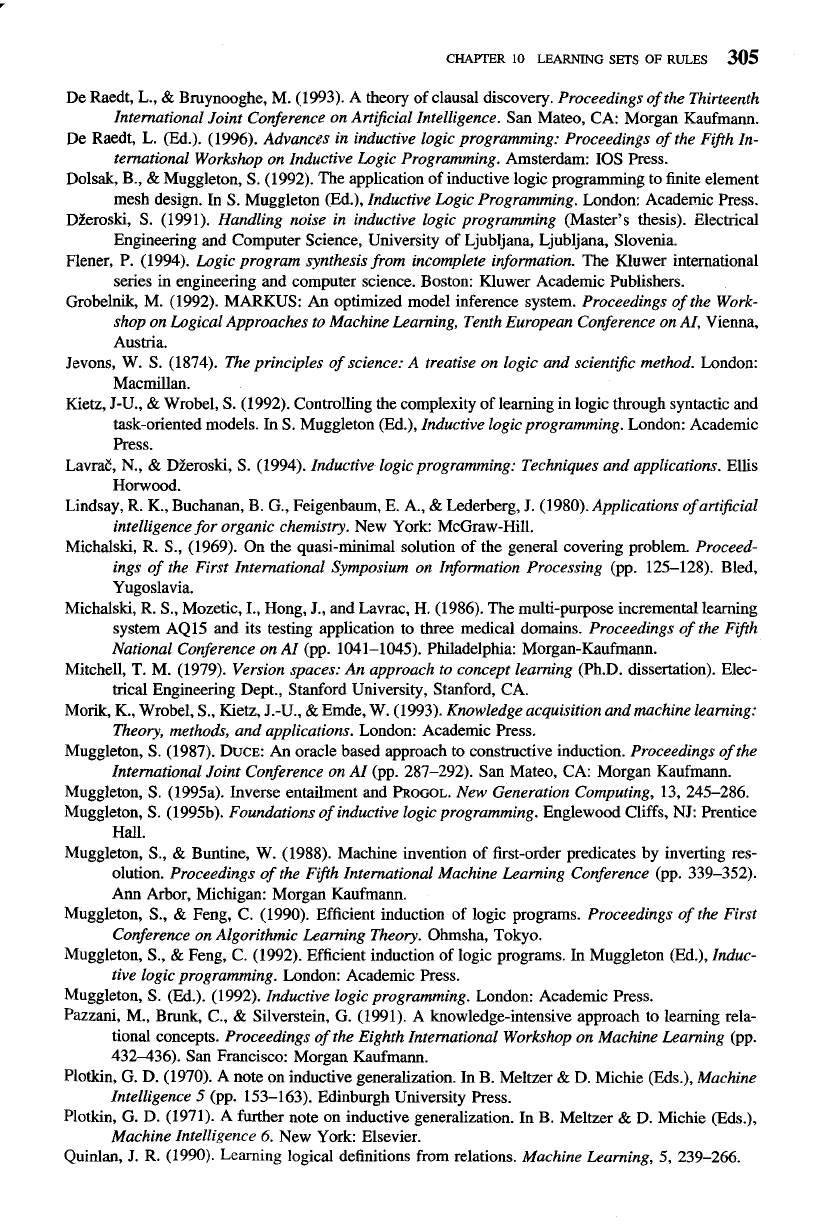
De Raedt, L.,
&
Bruynooghe, M. (1993). A theory of clausal discovery. Proceedings of the Thirteenth
International Joint Conference on ArtGcial Intelligence. San Mateo, CA: Morgan Kaufmann.
De Raedt, L. (Ed.). (1996). Advancm in inductive logic programming: Proceedings of the Fifh In-
ternational Workshop on Inductive Logic Programming. Amsterdam: IOS Press.
Dolsak, B.,
&
Muggleton, S. (1992). The application of inductive logic programming to finite element
mesh design. In S. Muggleton (Ed.), Inductive Logic Programming. London: Academic Press.
DZeroski, S. (1991). Handling noise in inductive logic programming (Master's thesis). Electrical
Engineering and Computer Science, University of Ljubljana, Ljubljana, Slovenia.
Flener,
P.
(1994). Logic program synthesis from incomplete information. The Kluwer international
series in engineering and computer science. Boston: Kluwer Academic Publishers.
Grobelnik, M. (1992). MARKUS:
An
optimized model inference system. Proceedings of the Work-
shop on Logical Approaches to Machine Learning, Tenth European Conference on AI, Vienna,
Austria.
Jevons, W. S. (1874). The principles of science: A treatise on logic and
scientijc method. London:
Macmillan.
Kietz, J-U.,
&
Wrobel, S. (1992). Controlling the complexity of learning in logic through syntactic and
task-oriented models.
In
S. Muggleton (Ed.), Inductive logic programming. London: Academic
Press.
LavraE, N.,
&
Dieroski, S. (1994). Inductive logicprogramming: Techniques and applications. Ellis
Horwood.
Lindsay,
R.
K., Buchanan,
B.
G., Feigenbaurn, E. A.,
&
Lederberg,
J.
(1980). Applications of art@cial
intelligence for organic chemistry. New York: McGraw-Hill.
Michalski,
R.
S., (1969). On the quasi-minimal solution of the general covering problem. Proceed-
ings of the First International Symposium on Information Processing (pp. 125-128). Bled,
Yugoslavia.
Michalski, R. S., Mozetic,
I.,
Hong,
J.,
and Lavrac, H. (1986). The multi-purpose incremental learning
system AQ15 and its testing application to
three
medical domains. Proceedings of the Fifh
National Conference on A1 (pp. 1041-1045). Philadelphia: Morgan-Kaufmann.
Mitchell,
T.
M. (1979). Version spaces: An approach
to
concept learning (Ph.D. dissertation). Elec-
trical Engineering Dept., Stanford University, Stanford, CA.
Morik,
K.,
Wrobel, S., Kietz, J.-U.,
&
Emde, W. (1993). Knowledge acquisition and machine learning:
Theory, methods, and applications. London: Academic Press.
Muggleton, S. (1987). DUCE:
An
oracle based approach to constructive induction. Proceedings of the
International Joint Conference on AI @p. 287-292). San Mateo, CA: Morgan Kaufmann.
Muggleton, S. (1995a). Inverse entailment and
PROGOL.
New Generation Computing, 13, 245-286.
Muggleton, S. (1995b). Foundations of inductive logic programming. Englewood Cliffs, NJ: Prentice
Hall.
Muggleton,
S.,
&
Buntine, W. (1988). Machine invention of first-order predicates by inverting res-
olution. Proceedings of the Fzfth International Machine Learning Conference (pp. 339-352).
Ann Arbor, Michigan: Morgan Kaufmann.
Muggleton,
S.,
&
Feng, C. (1990). Efficient induction of logic programs. Proceedings of the First
Conference on Algorithmic Learning Theory. Ohrnsha, Tokyo.
Muggleton, S.,
&
Feng, C. (1992). Efficient induction of logic programs.
In
Muggleton (Ed.), Induc-
tive logic programming. London: Academic Press.
Muggleton, S. (Ed.). (1992). Inductive logic programming. London: Academic Press.
Pazzani, M., Brunk, C.,
&
Silverstein, G. (1991). A knowledge-intensive approach to learning rela-
tional concepts. Proceedings of the Eighth International Workshop on Machine Learning (pp.
432-436). San Francisco: Morgan Kaufmann.
Plotkin, G. D. (1970). A note on inductive generalization. In B. Meltzer
&
D. Michie (Eds.), Machine
Intelligence
5
(pp. 153-163). Edinburgh University Press.
Plotkin, G. D. (1971). A further note on inductive generalization. In
B.
Meltzer
&
D. Michie
(Eds.),
Machine Intelligence
6.
New York: Elsevier.
Quinlan,
J.
R. (1990). Learning logical definitions from relations. Machine Learning, 5, 239-266.
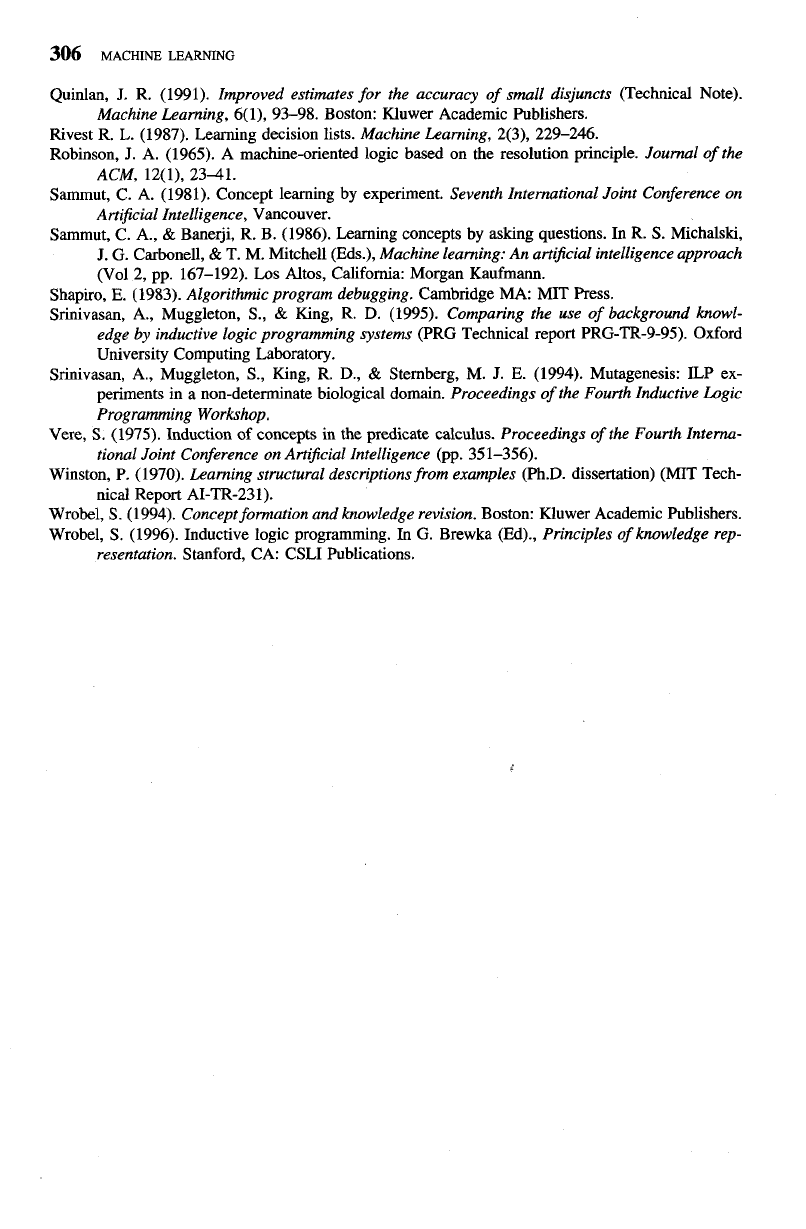
Quinlan,
J.
R. (1991).
Improved estimates for the accuracy of small disjuncts
(Technical Note).
Machine Learning,
6(1), 93-98. Boston: Kluwer Academic Publishers.
Rivest R. L. (1987). Learning decision lists.
Machine Learning,
2(3), 229-246.
Robinson,
J.
A. (1965). A machine-oriented logic based on the resolution principle.
Journal of the
ACM,
12(1), 23-41.
Sammut, C. A. (1981). Concept learning by experiment.
Seventh International Joint Conference on
Artijicial Intelligence,
Vancouver.
Sammut, C. A.,
&
Banerji, R.
B.
(1986). Learning concepts by asking questions. In R. S. Michalski,
J.
G. Carbonell,
&
T. M. Mitchell (Eds.),
Machine learning: An art$cial intelligence approach
(Vol 2, pp. 167-192). Los Altos, California: Morgan Kaufmann.
Shapiro, E. (1983).
Algorithmic program debugging.
Cambridge
MA:
MIT Press.
Srinivasan, A., Muggleton, S.,
&
King, R.
D.
(1995).
Comparing the use of background knowl-
edge by inductive logic programming systems
(PRG Technical report PRG-TR-9-95). Oxford
University Computing Laboratory.
Srinivasan, A,, Muggleton, S., King, R.
D.,
&
Stemberg, M.
J.
E.
(1994). Mutagenesis: ILP ex-
periments in a non-determinate biological domain.
Proceedings of the Fourth Inductive Logic
Programming Workshop.
Vere, S. (1975). Induction of concepts in the predicate calculus.
Proceedings of the Fourth Intem-
tional Joint Conference on Artijicial Intelligence
(pp. 351-356).
Winston, P. (1970).
Learning structural descriptions from examples
(Ph.D. dissertation)
(MIT
Tech-
nical Report AI-TR-231).
Wrobel, S. (1994).
Concept formation and knowledge revision.
Boston: Kluwer Academic Publishers.
Wrobel, S. (1996). Inductive logic programming. In G. Brewka (Ed).,
Principles of knowledge rep-
resentation.
Stanford, CA: CSLI Publications.
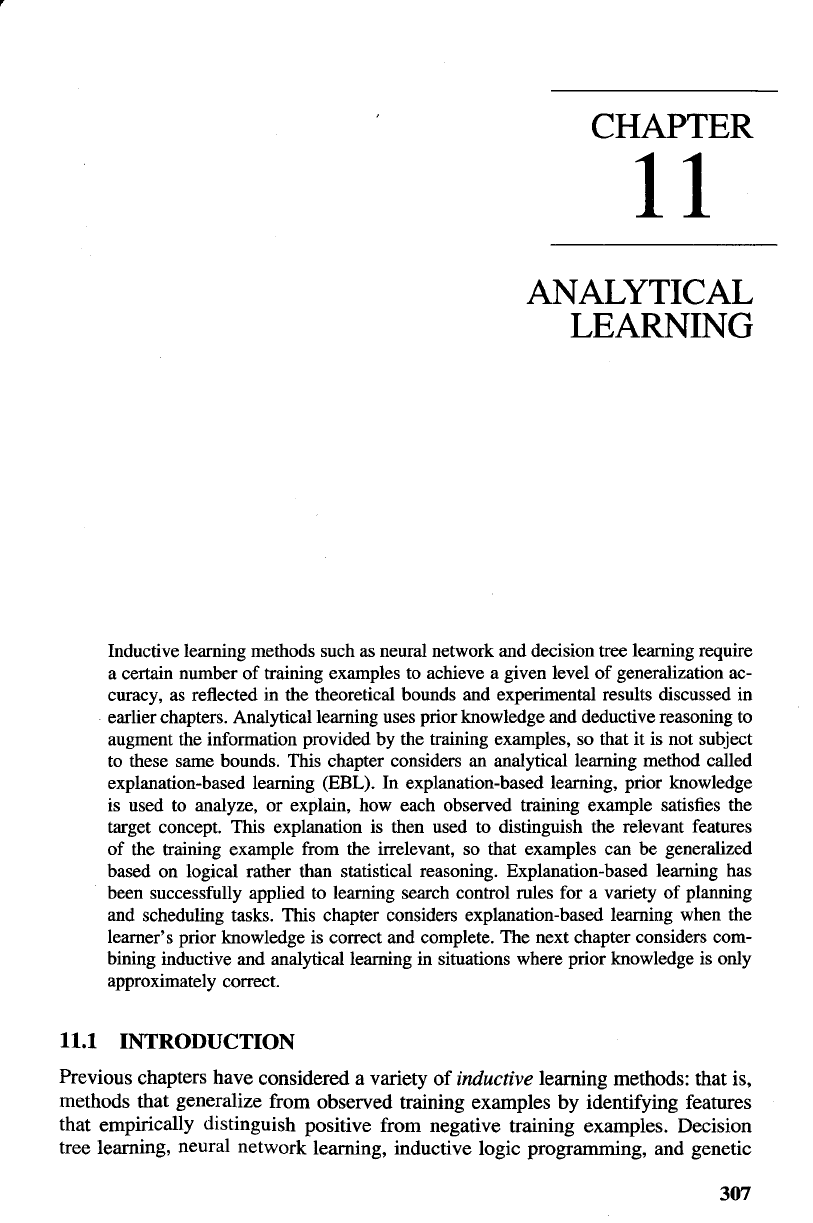
CHAPTER
ANALYTICAL
LEARNING
Inductive learning methods such as neural network and decision tree learning require
a certain number of training examples to achieve a given level of generalization ac-
curacy, as reflected in the theoretical bounds and experimental results discussed in
earlier chapters. Analytical learning uses prior knowledge and deductive reasoning to
augment the information provided by the training examples, so that it is not subject
to these same bounds. This chapter considers an analytical learning method called
explanation-based learning (EBL). In explanation-based learning, prior knowledge
is used to analyze, or explain, how each observed training example satisfies the
target concept. This explanation is then used to distinguish the relevant features
of the training example from the irrelevant, so that examples can be generalized
based on logical rather than statistical reasoning. Explanation-based learning has
been successfully applied to learning search control rules for a variety of planning
and scheduling tasks. This chapter considers explanation-based learning when the
learner's prior knowledge is correct and complete. The next chapter considers com-
bining inductive and analytical learning in situations where prior knowledge is only
approximately correct.
11.1
INTRODUCTION
Previous chapters have considered a variety of
inductive
learning methods: that is,
methods that generalize from observed training examples by identifying features
that empirically distinguish positive from negative training examples. Decision
tree learning, neural network learning, inductive logic programming, and genetic
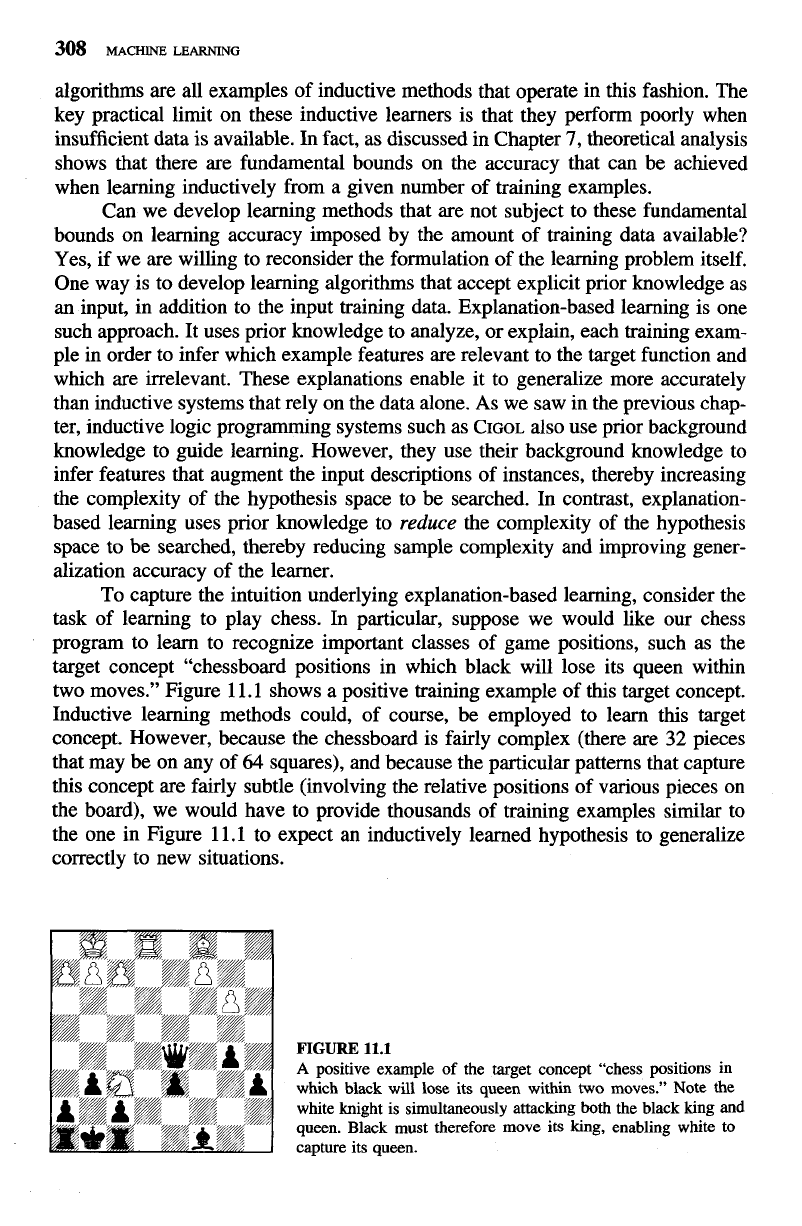
algorithms are all examples of inductive methods that operate in this fashion. The
key practical limit on these inductive learners is that they perform poorly when
insufficient data is available. In fact, as discussed in Chapter
7,
theoretical analysis
shows that there are fundamental bounds on the accuracy that can be achieved
when learning inductively from a given number of training examples.
Can we develop learning methods that are not subject to these fundamental
bounds on learning accuracy imposed by the amount of training data available?
Yes, if we are willing to reconsider the formulation of the learning problem itself.
One way is to develop learning algorithms that accept explicit prior knowledge as
an input, in addition to the input training data. Explanation-based learning is one
such approach. It uses prior knowledge to analyze, or explain, each training exam-
ple in order to infer which example features are relevant to the target function and
which are irrelevant. These explanations enable it to generalize more accurately
than inductive systems that rely on the data alone. As we saw in the previous chap-
ter, inductive logic programming systems such as
CIGOL
also use prior background
knowledge to guide learning. However, they use their background knowledge to
infer features that augment the input descriptions of instances, thereby increasing
the complexity of the hypothesis space to be searched. In contrast,
explanation-
based learning uses prior knowledge to
reduce
the complexity of the hypothesis
space to be searched, thereby reducing sample complexity and improving gener-
alization accuracy of the learner.
To capture the intuition underlying explanation-based learning, consider the
task of learning to play chess. In particular, suppose we would like our chess
program to learn to recognize important classes of game positions, such as the
target concept "chessboard positions in which black will lose its queen within
two moves." Figure 11.1 shows a positive training example of this target concept.
Inductive learning methods could, of course, be employed to learn this target
concept. However, because the chessboard is fairly complex (there are
32
pieces
that may be on any of
64
squares), and because the particular patterns that capture
this concept are fairly subtle (involving the relative positions of various pieces on
the board), we would have to provide thousands of training examples similar to
the one in Figure 1 1.1 to expect an inductively learned hypothesis to generalize
correctly to new situations.
FIGURE
11.1
A
positive example of the target concept "chess positions in
which black
will
lose its queen within two moves." Note the
white knight is simultaneously attacking
both
the black king
and
queen. Black must therefore move its king, enabling white to
capture its queen.
